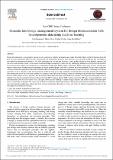Semantic knowledge management system for design documentation with heterogeneous data using machine learning
Author(s)
Gammack, Jack; Akay, Haluk; Ceylan, Ceylan; Kim, Sang-Gook
Download1-s2.0-S2212827122006680-main.pdf (1.685Mb)
Publisher with Creative Commons License
Publisher with Creative Commons License
Creative Commons Attribution
Terms of use
Metadata
Show full item recordAbstract
Design documentation is presumed to contain massive amounts of valuable information and expert knowledge that is useful for learning from the past successes and failures. However, the current practice of documenting design in most industries does not result in big data that can support a true digital transformation of enterprise. Very little information on concepts and decisions in early product design has been digitally captured, and the access and retrieval of them via taxonomy-based knowledge management systems are very challenging because most rule-based classification and search systems cannot concurrently process heterogeneous data (text, figures, tables, references). When experts retire or leave a design unit, industry often cannot benefit from past knowledge for future product design, and is left to reinvent the wheel repeatedly. In this work, we present AI-based Natural Language Processing (NLP) models which are trained for contextually representing technical documents containing texts, figures and tables, to do a semantic search for the retrieval of relevant data across large corpora of documents. By connecting textual and non-textual data through the use of an associative database, the semantic search question-answering system we developed can provide more comprehensive answers in the context of users’ questions. For the demonstration and assessment of this model, the semantic search question-answering system is applied to the Intergovernmental Panel on Climate Change (IPCC) Special Report 2019, which is more than 600 pages long and difficult to read and understand, even by most experts. Users can input custom queries relating to climate change concerns and receive evidence from the report that is contextually meaningful. We expect this method can transform current repositories of design documentation of heterogeneous data forms into structured knowledge-bases which can return relevant information efficiently as well as can evolve to embody manageable big data for the true digital transformation of design.
Date issued
2022Department
Massachusetts Institute of Technology. Department of Mechanical EngineeringJournal
Procedia CIRP
Publisher
Elsevier BV
Citation
Gammack, Jack, Akay, Haluk, Ceylan, Ceylan and Kim, Sang-Gook. 2022. "Semantic knowledge management system for design documentation with heterogeneous data using machine learning." Procedia CIRP, 109.
Version: Final published version
ISSN
2212-8271
Keywords
General Medicine